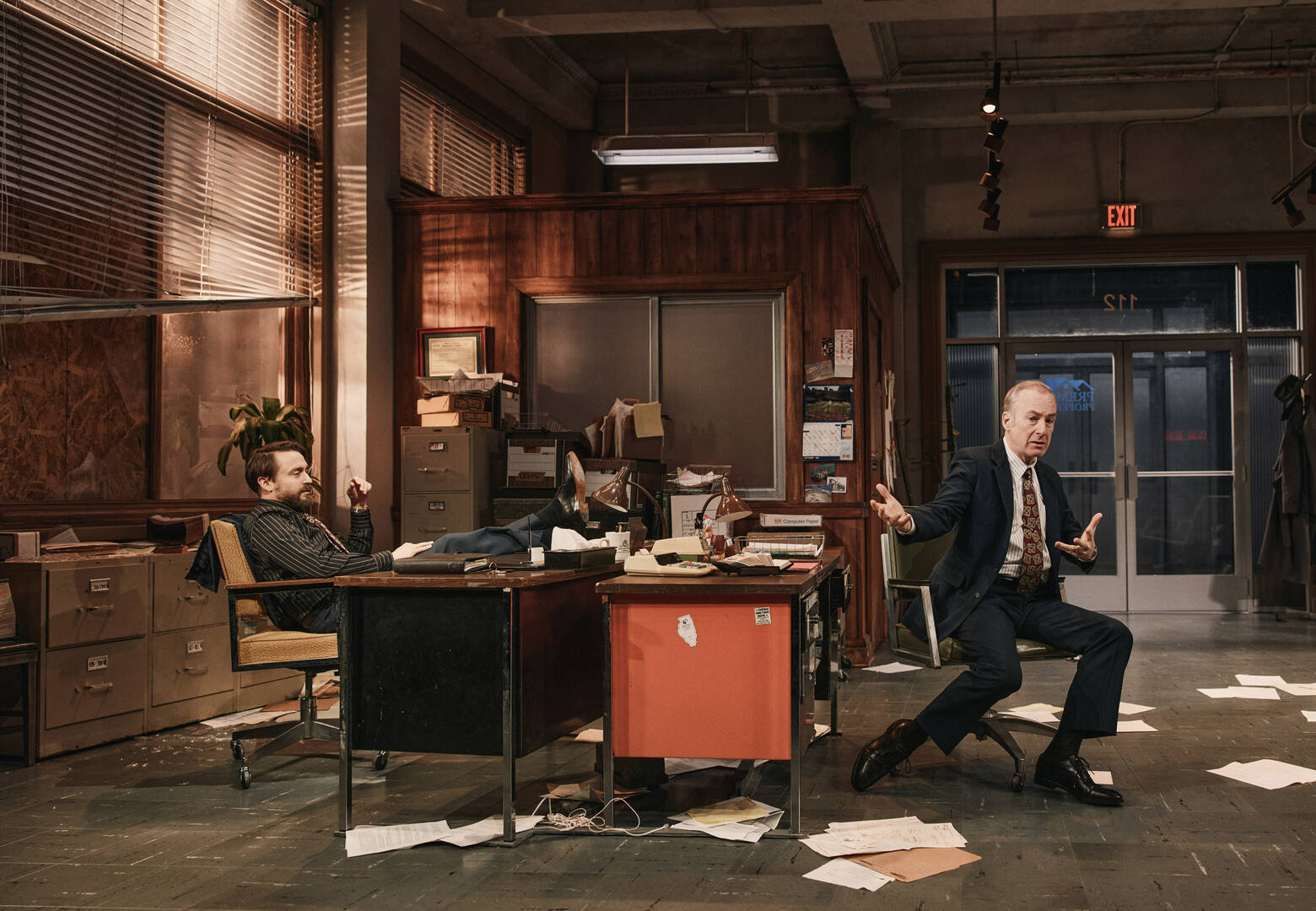Men are increasingly in crisis, the social scientists tell us, and certainly the statistics can be furnished: plunging life expectancy and educational attainment, rising rates of depression and domestic violence. The diagnosis of toxic masculinity—which originated in the men’s movement of the 1980s as a way to distinguish damaging gender expectations from what its adherents thought of as true manliness—offers one convincing, if limited, explanation for this unsettling decline in male fortunes, even as men continue to hold the overwhelming majority of worldly power, not least in our current presidential administration.
It is not a new idea: that the ostensible rulers in a socially oppressive structure are also imprisoned by it, and that ostentatious shows of force are signs of weakness, not strength. Who is more brittle and defensive—and dangerous—than a man who feels his power slipping? In two starry new Broadway revivals, the spectacle of self-defeating male competition and betrayal is the main draw, though the results vary widely. In director Kenny Leon’s stiff staging of “Othello,” a jarhead Iago (Jake Gyllenhaal) runs circles around a bewildered Othello (Denzel Washington), plotting his superior’s downfall out of a sense of resentment that could be racial or generational, or both. And in a crisp, mostly persuasive new production of David Mamet’s 1983 “Glengarry Glen Ross,” a discordant quartet of real estate salesmen scrabble for an edge in a world of rapacity and scarcity. “We cannot all be masters,” Iago says early on. In both plays, the quest for mastery is a dead loss for everyone.
The failures of this “Othello” will be familiar to anyone who’s seen a lot of admirably intentioned but mediocre Shakespeare. We get a half-hearted modern-dress setting in which business suits give way to military camo; confused staging that makes exits and entrances seem clunkier than need be; perfunctory stage violence; ponderous line readings. Leon has successfully staged Shakespeare before; his ebullient “Much Ado About Nothing” in Central Park in 2022 was an unqualified triumph, and his “Hamlet” in the park last year, though a mixed bag, had its moments.
This “Othello” has fewer high points, with the drama sparking in just a few scenes, most of them involving Gyllenhaal’s pumped-up Iago or Kimber Elayne Sprawl’s no-nonsense Emilia. Though Washington, as Othello, seems distracted and distant through most of the show, he and Gyllenhaal have at least one strong duet: in the crucial exchange in which Iago first gingerly but deliberately plants the seeds of doubt about Othello’s wife, Desdemona. The inception takes, and we can see in real time Othello begin to glimpse the outline of Iago’s insinuations. Done this well, Shakespeare can seem startlingly contemporary and subtle. (Still, one good scene is hardly worth ticket prices that average north of $300 and run as high as $921.)

Like the pitch Iago makes to Othello, the spiels of the salesmen in “Glengarry” have a sneaky, subtextual logic, though they’re hardly subtle—we can always see clearly that they’re trying to get one up on each other or their hapless clients. It’s how they come at their targets that gives this play its unique comic energy. Sad-sack Shelly Levene (Bob Odenkirk) tries to wear down office manager Williamson (Donald Webber Jr.) with a whiny sob story and a cut of his take. The bitter Moss (Bill Burr) shadowboxes the taciturn Aaronow (Michael McKean) into considering a burglary plot. Meanwhile Ricky Roma (Kieran Culkin) approaches his mark, a diffident nobody named Lingk (John Pirruccello), with an alternately profane and profound prose poem about relativism and impermanence.
That’s just the first act. The longer second act, set in a dispiriting wood-paneled office, plays out in the vein of a classic American tragedy, in which lies unravel into painful truths and each character lets loose an aria that garners exit applause. It’s here that we see Levene recount to Roma in detail his latest sales triumph, and Odenkirk’s performance—till now a bit shaky and over-caffeinated—finds its stride. It is impossible not to recall the yarn-spinning, ambulance-chasing lawyer he memorably played in “Breaking Bad” and “Better Call Saul.” As Levene, though, he looks sadder and grayer, like a more manic Bob Newhart, and his final exit has a real sting of pathos.
Burr makes an ideally bullet-headed Moss, while McKean gives a master class in reaction and sighing resignation. As the office punching bag, Williamson, Webber marshals a cool fury I have never seen in this otherwise thankless role. But it’s Culkin, recent Oscar winner for “A Real Pain,” who coolly dominates this sales office. Unlike Roman Roy, the crude, conniving heir he played for four seasons on HBO’s “Succession,” and very much unlike Oedenkirk’s nervy Levene, Culkin’s Roma has the extraordinary, attention-gathering confidence of stillness and quiet. Even when blowing his top, he’s somehow self-contained.
Near the end of “Glengarry,” Roma somewhat implausibly but tellingly goes soft, lamenting to Levene that the “world of clock watchers, bureaucrats, office holders” is “not a world of men.... We are the members of a dying breed.” Good riddance, you might reasonably respond. But the material and spiritual desolation that drives the fictional men in these two plays, as they claw at each other in a mutual death grip, is not a thing of the past, let alone of fiction. Othello, even before he’s snared into pointless jealousy, presciently recognizes that without love and trust, as he puts it, “Chaos is come again.”








